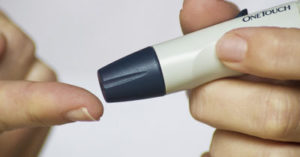
A few years ago it was not uncommon for an individual to be diagnosed with the sinister type 2 diabetes at the age of 50 or above. However, today there are a number of individuals being diagnosed with type 2 diabetes at the ripe age of thirty and even twenty!
The extent to which this health disorder had spread is truly alarming. However, owing to our passive lifestyles, unhealthy diets, and work-life stress levels, it cannot be denied that this was perhaps bound to happen. And while diabetes has managed to become a household name, the health risks caused by this health disorder is no joke.
So if you have been recently diagnosed with type 2 diabetes, surely your doctor has briefed you on the health risks and diet restrictions you need to follow. However, in this article, we provide you with additional helpful and reasonable guidelines you could incorporate into your life, to manage your diabetes symptoms better and a step closer to getting better.
I Have Diabetes, Now What?
The diagnosis of any health disorder, especially a life-changing one such as type 2 diabetes, can be difficult to understand and deal with. It is common for a newly diagnosed diabetic patient to feel depressed or even stressed out at times.
However, remember acceptance is the most important step of all. Because accepting your health disorder is the first step towards getting yourself treated. If you are diagnosed with type 2 diabetes, this means that your body is no longer able to respond to insulin effectively. This, in turn, leads to high blood glucose levels which could contribute many other serious health problems.
Get Yourself Treated!
A common concern of every newly diagnosed diabetic patient is whether their health disorder is curable or not. While type 1 diabetes cannot be reversed, the good news is that type 2 diabetes is in fact reversible! According to leading doctors, type 2 diabetes can be effectively treated and reversed if the health disorder is diagnosed in time.
The most important part of your treatment is to visit your doctor for check-ups regularly. Ignoring or not taking proper care of your health condition will only lead to further health complications for you in the future.
Learn More: 5 effects of diabetes on your body
Get Diabetes – Savvy
The best thing you can do is to arm yourself with knowledge about your health disorder. So try and get in touch with family or friends who suffer from diabetes or join a diabetes education program. You could also read diabetes journals and magazines to improve your understanding of your health disorder.
It will also be wise to educate yourself on the symptoms and health conditions related to diabetes, such as hypoglycemia [Ref] or low blood sugar levels, loss of vision, kidney failure extra.
Buy Yourself A Glucose Meter
 Another important step is to get yourself a glucose meter to use at home, or one you can carry with you while travelling. With the help of this meter, you will be able to keep a constant check on your blood glucose levels. If you a type 2 diabetes patient, we recommend you check your levels at least two times a day.
Another important step is to get yourself a glucose meter to use at home, or one you can carry with you while travelling. With the help of this meter, you will be able to keep a constant check on your blood glucose levels. If you a type 2 diabetes patient, we recommend you check your levels at least two times a day.
Target results would read as follows:
- 72 mg/dL (4 mmol/L) – 126 mg/dL (7mmol/L) before meals
- Less than 154 mg/dL (8.5mmol/L) two hours after meals
You could also prepare a daily progress chart for yourself, to identify fluctuations or changes in your blood sugar levels throughout the day.
The Diabetic Management Plan
So if you have been recently diagnosed with type 2 diabetes, surely your doctor has briefed you on the health risks and diet restrictions you need to follow. However, the kind of treatment you receive will strongly depend upon when exactly your diabetes is diagnosed. The sooner your diabetes is diagnosed, better are the chances of getting your blood sugar levels under control.
Importance of Medication
The medications you receive from your doctor will be based upon many personalized factors, such as your test results, and also how resistant your body is towards insulin. Oral medications or insulin injections may be a common part of your treatment. Also, based on how well your blood sugar levels respond to various medications and therapies, your medications may keep changing from time to time.
However, before embarking on any new medications, make sure your doctor has complete knowledge of your medical history. This is necessary as certain drugs could at times cause unwanted side effects, which may prove harmful.
If you have problems with strong medication or are allergic to certain drugs, it would be a good idea to search for dietary supplements instead. These are not so harsh on your system and will also not cause any unwanted side effects.
Diet Control & Exercise
Diet is the key to managing and controlling type 2 diabetes. Here are some important dietary guidelines you should follow if you are diagnosed with type 2 diabetes.
- A low carbohydrate diet helps prevent spikes in blood sugar levels
- Eating heart healthy fats keeps cholesterol levels in check and protects against heart problems
- Opt for the least processed grains, as well as high fiber foods
- Eat smaller portions of food.
- Include a variety of fresh fruits and vegetables into your diet.
- Add low-sugar fruits such as avocados and bananas into your diet.
- Stay away from sugary sodas and fruit juices.
I Have Diabetes What Can I Eat?

All you need to do is follow the LCHF (low carbohydrate, high fat) principle. In short, this means that a diabetic patient should keep their carbohydrates intake low, and increase their healthy fats intake.
Here are diabetic foods to eat list for you to refer too.
- Dark chocolate
- Broccoli
- Blueberries
- Oats
- Fish
- Olive oil
- Psyllium husk
- Cannellini beans
- Spinach
- Sweet potatoes
- Walnuts
- Quinoa
- Cinnamon
- Collard greens
- Tumeric
Also, you could consider keeping a food diary. This might come in handy to you or your doctor in figuring out which food causes a spike in your blood sugar levels and which foods do not. Check out a complete diabetes meal plan!
Exercise A Little
If you never cared about your weight before, now would be a good time to start paying attention to it. Being overweight or obese can have a negative effect on your blood sugar levels, as well as, contribute to unwanted health problems.
Thus, apart from following a healthy diet, and taking your medications on time, daily exercise or even brisk walking can go a long way in getting your diabetes under control. However, before embarking on any new exercise regime make sure you discuss it with your doctor first, to make sure it is a safe choice for you.
What Causes Diabetes?
Genetics, an unhealthy diet, and a sedentary lifestyle are some of the leading factors behind the occurrence of diabetes. Therefore, it is important to beware of the early warning signs of diabetes.
These are the symptoms of type 2 diabetes.
- Constant feeling of thirst & hunger
- Frequent urination
- Unexplained weight loss
- Blurred vision
- Tiredness & Irritability
- Slow healing of cuts or sores
- Frequent gums, skin, or vaginal infections
If one is able to identify the onset of type 2 diabetes before it develops, it is possible to make the necessary lifestyle and diet changes required to ward of the health disorder, before it strikes!
Useful Diabetes Health Tips
While an unhealthy lifestyle and diet are the well-known culprits behind diabetes, another dangerous factor contributing to diabetes is stress. while stress can cause high blood pressure, it can also increase one’s risk of developing diabetes.
This is because stress affects the entire hormonal system of the body and at times, could also cause sugar levels to shoot up to dangerous levels. So make sure you practice yoga or meditation at least 3-4 times a week. You could also drink a cup chamomile tea before bed, to calm your mind and enjoy a good night sleep.
Here are a few more health tips to follow if you are diagnosed with type 2 diabetes or want to lower your risk of developing the health disorder.
- Exercise or go for a 20 minute brisk at least 5-6 times a week
- Cut down on sweetened drinks
- Avoid heavily processed and sugar-laden foods
- Detoxify your body by consuming fresh fruit or vegetable juices
These health tips will not only help you manage your diabetes better but will also improve your overall mental and physical well-being!
